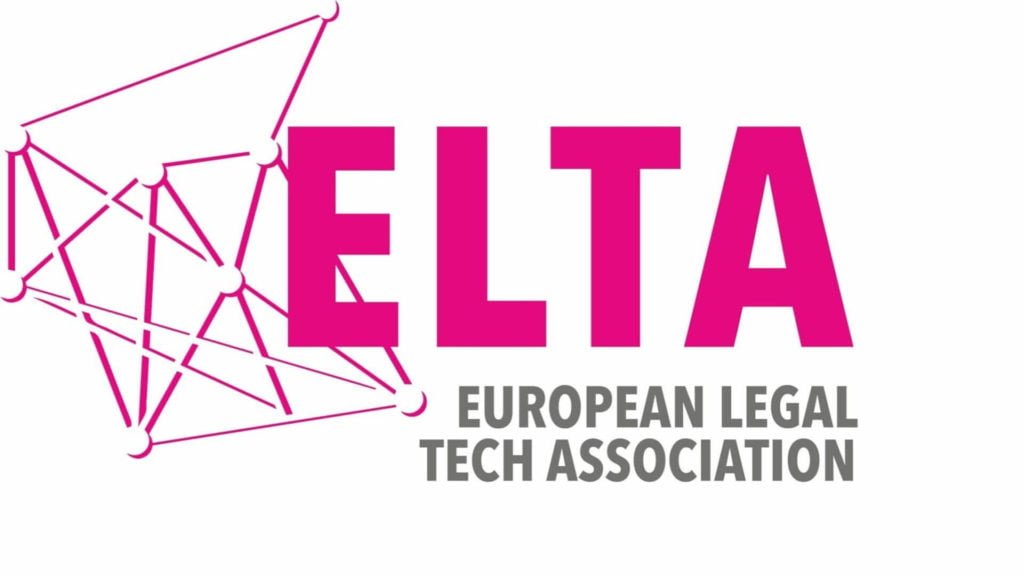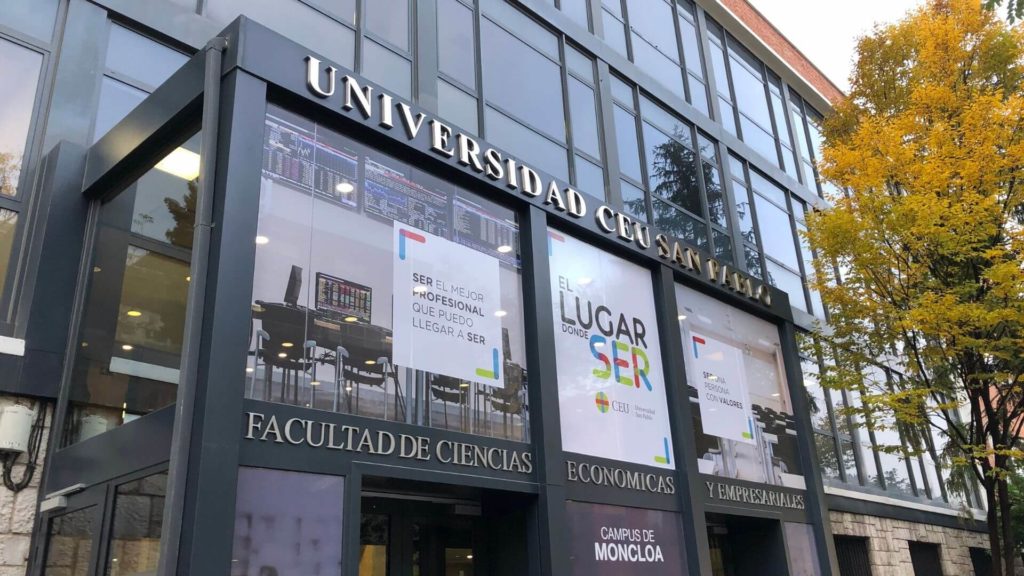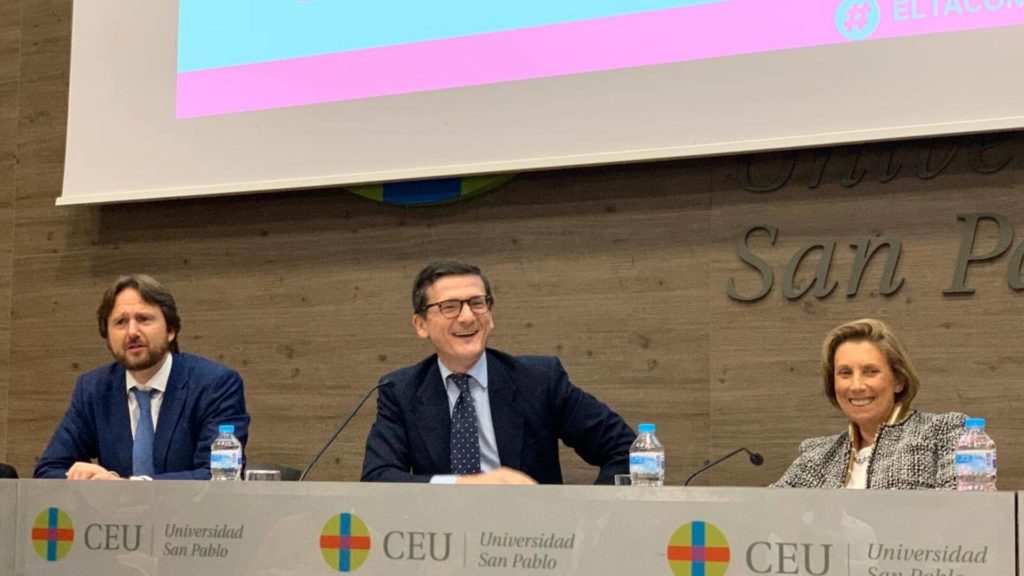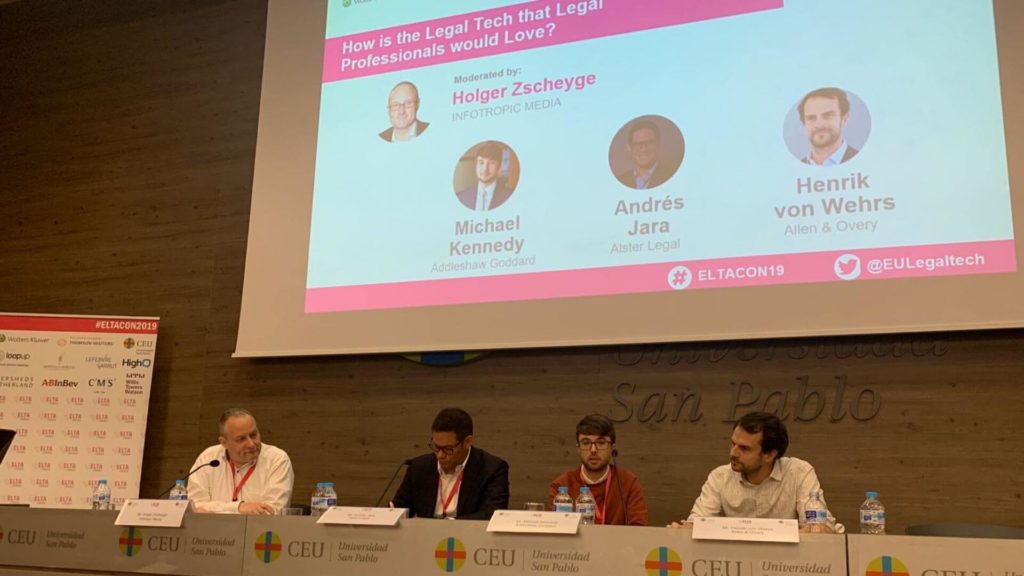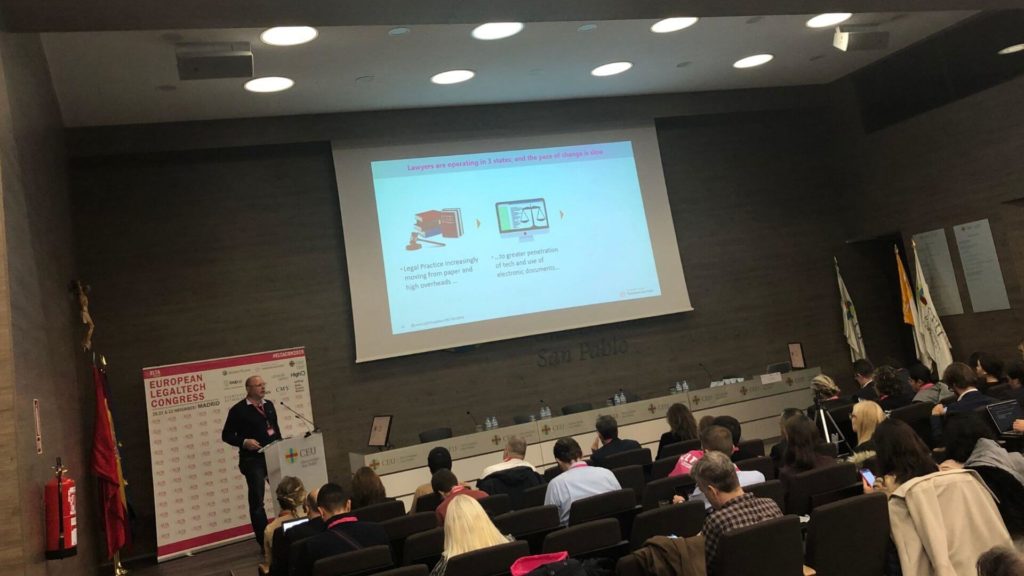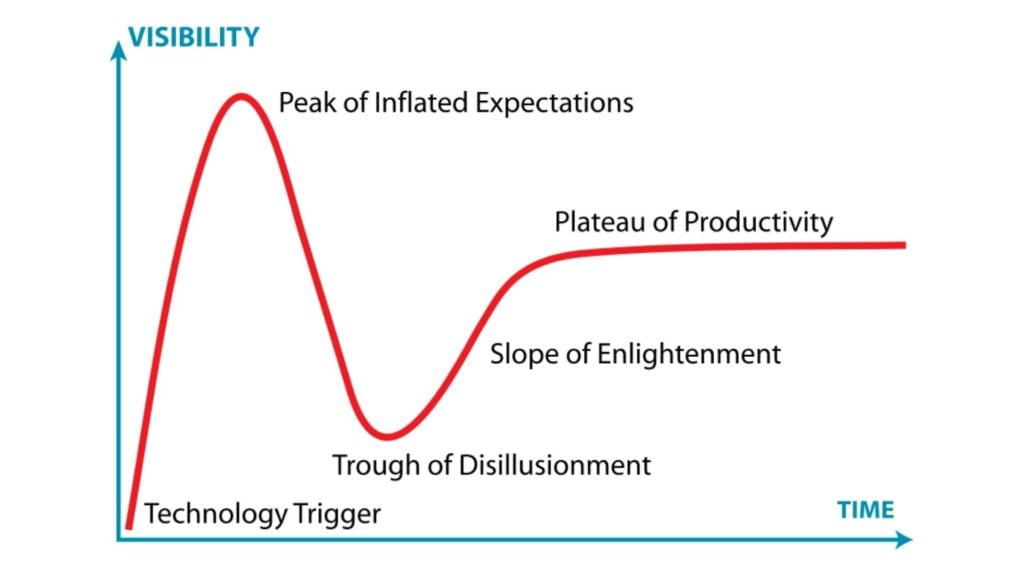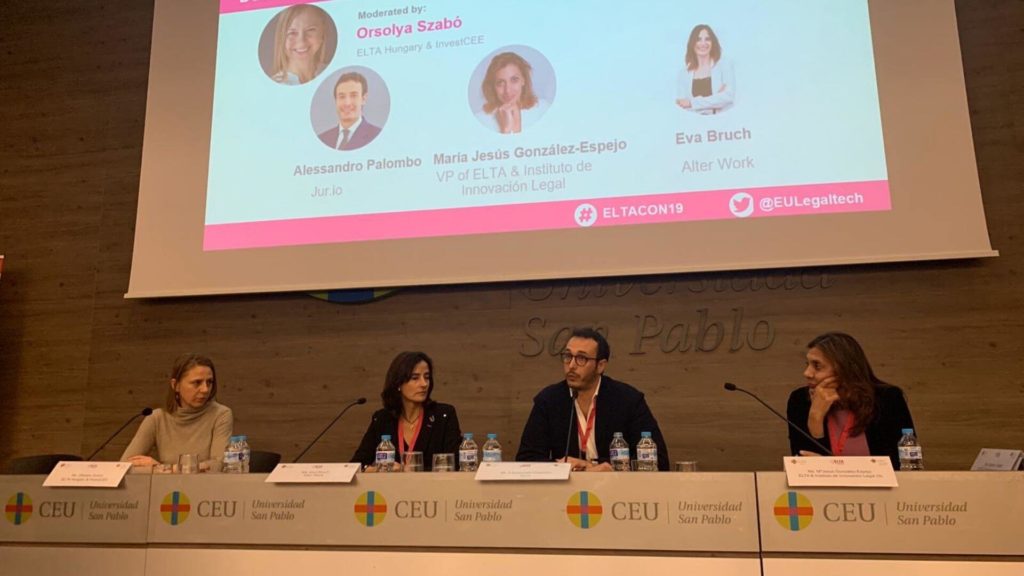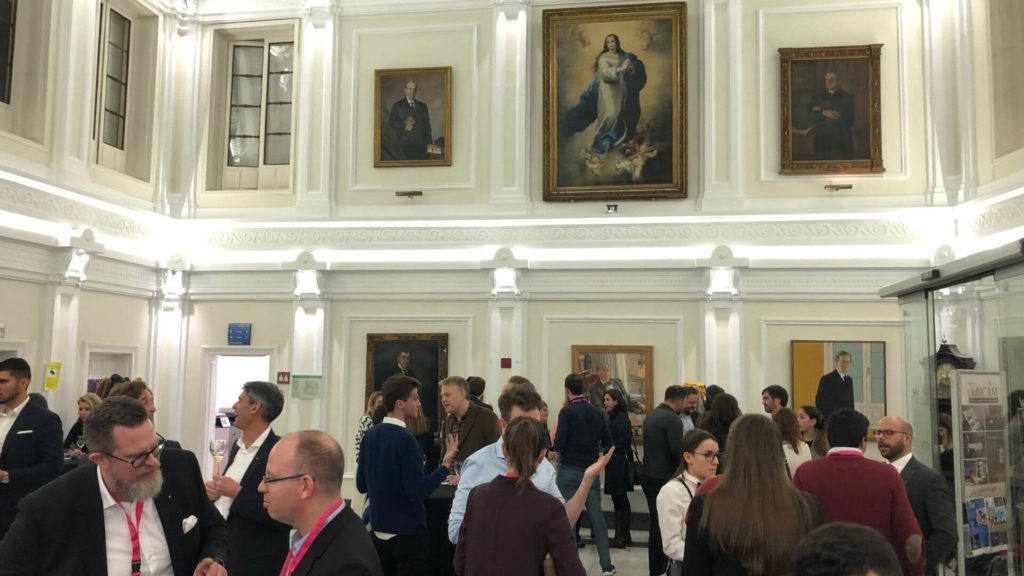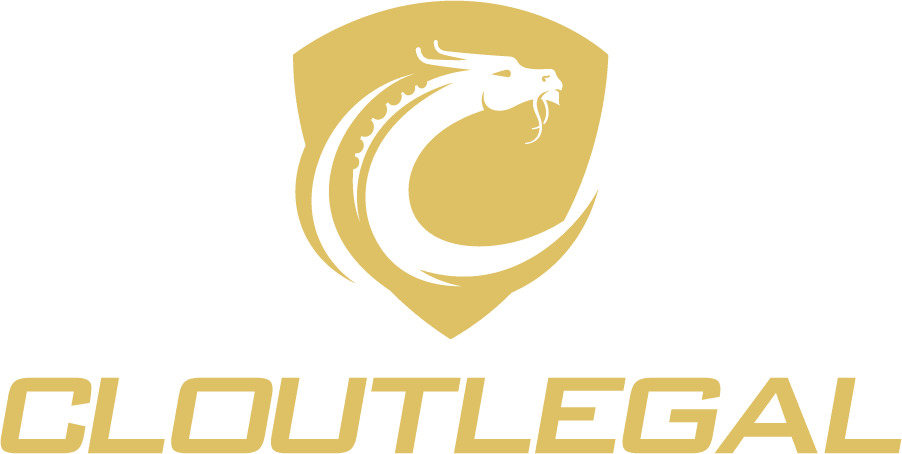What you missed from the ELTA 2019 congress
"It's not a long-term business model to take advantage of your consumers in ways that are not sustainable…" - Richard Cordray
The future may not be evenly distributed, but it is already here. That much was clear from the recently held European Legal Tech Association (ELTA) 's annual Congress in Madrid.
In this article, I will share the following:
- Some background info on ELTA;
- Summary of the Congress;
- Key insights and takeaways.
And before we dive right in:-
Your time is in high demand [TL;DR]
For all of you busy people - here is ELTA Madrid congress in just four sentences:
The #ELTAcon19 Congress was an absolute blast and the right place for all interested in the legal sector innovation. It gathered people from all walks of life - both among speakers and attendees.
Legal education institutions, regulators and policymakers, traditional legaltech vendors as well as the NewLaw / Alternative Legal Service Providers (ALSPs), Legal Departments, Law Firms, and students - they were all represented at the Congress.
Finally, the Congress represented 33 countries coming from Europe, North America, and Latam.
What is European LegalTech Association (ELTA)?
ELTA is a non-profit NGO aiming to advance legal innovation in Europe. The focus of ELTA is both on the technology that supports the legal services industry (hence "legal tech" in the name), as well as on transformative business models. ELTA currently boasts 5,500 members, spread over 39 countries, representing (nearly?) all stakeholders mentioned above.
ELTA's goals are to:
- Raise awareness of technology and software supported solutions and processes in the European legal market.
- Create a transparent platform to facilitate and support networking among the various European protagonists and stakeholders in the fields of legal tech.
- Regularly inform our members about important current topics, trends, and developments as well as arranging legal tech events.
- Promote academic surveys and studies, as well as research in the fields of legal tech and its neighboring disciplines.
- Contribute to vocational training and further education in the fields of legal tech.
I remember discussing ELTA's mission with Hariolf Wenzler, one of its founders and present Board members, while ELTA was still in the idea stage. It has been fascinating to follow the growth and overall progress.
ELTA has proven to be one of the most influential legaltech advocates on the Old Continent, and I am looking forward to what is to come in the upcoming years.
Universidad CEU San Pablo - the venue of ELTA's Annual Congress 2019 in Madrid
#ELTAcon19 in a nutshell
Held at CEU San Pablo University, the #ELTAcon19 was prepared and executed by Instituto de Innovación Legal. María Jesús González-Espejo (the head of the mentioned partner and ELTA's Board member) has made sure that attendees feel at home, as well as that everything runs smoothly. Maria has undoubtedly set the bar for next Congress organizers pretty high.
The #ELTAcon19 took place over the course of two days. During the first day, renowned legal innovation experts shared their view of the current state of legaltech adoption and innovative thinking during panel discussions and keynotes.
The second day brought us "the doers" - i.e., legaltech vendors, tech, and ALSPs startup founders, as well as students that attempt to innovate the sector from Universities (i.e., the "ground up" approach). In addition to keynotes, the second day brought us short pitches where "the doers" presented how their work, and how it affects the innovation in the legal sector, from their respective environments.
Before I move on to actual speakers and topics, I need to point out that I still notice a slight confusion/conflation of legaltech and Newlaw / Alternative Legal Services Providers.
E.g., some would use "legaltech" as an umbrella term for both traditional technology vendors (that support existing business models) and Newlaw players.
While this may not be necessarily wrong, it is a bit imprecise - and I feel the distinction needs to be made clear.
Legaltech is just that - technology, agnostic of any underlying business models, while the Newlaw / ALSPs focus on innovative business models that are ENABLED by technology.
ELTA Congress kick-off
Carlos Perez del Valle, of the CEU San Pablo, in his opening words, stressed that technology is here to stay - which makes it imperative for lawyers to understand it. The Internet shaped our lives beyond our comprehension, and legaltech is doing just the same.
And while some of the legal professionals are still wrapping their heads around the "bread and butter" legal tech products (such as e.g., legal billing or CRM systems), blockchain is bringing new applications and questions altogether.
And while awareness of legaltech grows, lawyers will be much better off putting themselves at the forefront of this evolution - be it in data management, operational efficiency, novel business models, or data security (among others).
Nobody holds all the answers. Problems do and will arise along the way, but we must be ready to keep asking questions with our minds open. What we do today inevitably lays the foundation for our future.
What is the future of the legal services market?
The International Associations' view
The first panel of the day presented gathered representatives of ILTA (International Legal Technology Association), ECLA (European Company Lawyers Association), and RIAD (International Association of Legal Protection Insurance).
Markus M. Schmit, the Managing Director of ECLA, presented their vision from the angle of in house corporate legal departments (i.e., CLDs for brevity). Representing roughly around one-third of the entire market share, inhouse legal departments remain the most influential buyers of legal services.
There are around 300,000 corporate legal counsels in Western Europe alone, where the corporates are currently hiring about 25% of all lawyers. Additionally, corporate legal departments are now the fastest-growing segment in the legal community.
Therefore, their views indeed bear lots of relevance for all stakeholders in the legal services ecosystem.
Markus stressed that CLDs face structural changes that will be relevant for the coming 20 years.
Panelists Henrik von Wehrs, Andres Jara, Michael Kenedy, with the panel host Holger Zscheyge at ELTAcon19
The rapid growth of in house legal teams
In house legal departments have been growing year over year, influenced by a few factors:
- Increasing internationalization of commerce and work - with developing globalization, the complexity of compliance framework grows (mirrored by the growth in headcount);
- The trend to relocate government tasks to CLDs - putting greater responsibility on legal departments to stay compliant, thus further increasing their workload;
- The cost pressure - it is already known that CLDs also frequently opt to solve some projects inhouse, rather than to delegate to law firms - as they realized it is often more cost-effective to do so.
All the above lead to the following statistics:-
Currently, German corporations have about 5 in house lawyers for every billion of revenue - which is a 100% increase over the period of the last ten years. The US companies are even beyond that number.
Legaltech is of strategic importance to in-house legal teams
Markus shared a survey where around 7% of respondents (CLDs) already have a position in charge of implementing legaltech for their in-house legal teams. And usually, the first step in implementing legaltech is understanding their processes. Most of those are yet to be mapped out.
Hence, in Markus's words, CLDs frequently turn to external consultants that help structure processes. Moreover, CLDs often rely on external help to screen the market and decide which legal tech solutions fit their needs the best.
Legal Departments are insourcing the work
As mentioned, cost pressure induces in-house legal teams to grow their headcount and retain projects that would otherwise go to law firms. However, this doesn't mean that inhouse teams do not need law firms anymore.
It seems as (due to all the mentioned macro trends) legal departments are increasing both the internal AND external legal spend.
Quite exciting times, indeed.
Jim Leason during his keynote at ELTAcon19 in Madrid
Marti Phillips, VP of Education at International Legal Technology Association (ILTA), mentioned that each year, ILTA surveys their 25,000+ members for relevant trends. And the most recent survey returned yielded some interesting insights for those that aim to further legaltech adoption in CLDs and Law Firms:
#1 - Focus on people. The number one issue in every change is change management (i.e., even the most valuable software solution makes no impact if left unused).
#2 - Cloud strategy. Everyone seems to be talking about the Cloud and mobility in the States. ILTA feels it is clear that cloud infrastructure is inevitable, and its full adoption only a matter of time. As Marti pointed, even Corporate Legal Departments use the Cloud - and they DO have security requirements they must follow. Law Firms want to be part of the Cloud, but problems might be the cost, security, and, mostly, the people side of the change.
#3 - Focus on the actual problem. What business case are you trying to solve with the legaltech you are offering/sourcing? Are you meeting the real needs of your General Counsel or Law Firm Partner(s)?
Not many lawyers think like business people
Simon Warr, President of the International Association of Legal Protection Insurance (RIAD), noted that not many lawyers think like business people. Instead, they may be more inclined to consider themselves professionals.
And before pondering about its future - how do we define the legal services market?
In Simon's view - the market is the entire ecosystem - involving lawyers and law firms, naturally, but also Corporate Legal Departments, Alternative Legal Services Providers (i.e., the newlaw). The future of the market, Simon stressed, are still solicitors - lawyers - attorneys - however, only those that are ready to accept legal technology.
And while legaltech varies across the board - from traditional "bread and butter" case management systems, to modern AI solutions - there isn't a single answer as to what technology should lawyers use. That depends much on its business model.
The future is bright as long as lawyers are ready to modernize. For those that feel they can merely continue to charge hourly rates, then, well, let's say it may not be as bright.
The Legal Tech vendors' and Big Fours' view
The next segment involved some of the leading legaltech providers, as well as a representative of KPMG, one of the Big 4. Namely: Chantal Vermeire (Wolters Kluwer), Juan Pujol (Groupe Lefebvre Sarrut), and Sebastian Hartmann (KPMG).
The panelists agreed that, for the most part, the future is already here. The present is already exciting as is. In short, legaltech adoption increases, while legal professionals adapt to serve their clients better.
Meanwhile, the whole new ecosystem emerges. In addition to legal departments insourcing, law firms are nowadays competing with Alternative Legal Service Providers (ALSP), Managed Legal Services (MLS), and Legal Process Outsourcing (LPO). Sebastian Hartmann stressed that KMPG uses all of the above, in one way or another.
Reflecting on the need to innovate, Juan Pujol pointed that once the change becomes apparent - it is already too late. Similar to a Tsunami - it arrives silently at first and only makes lots of noise once it hits the shore.
Business outcomes drive buying decisions
"If you want to innovate - something needs to happen before you go to see your client…" - Sebastian Hartmann
And that is non-billable work.
(gasps)
Hence, the billable model can lead legal professionals into a tunnel vision (more on that later), so Partners need to recognize it and do something to break the mold of merely selling hours.
Finally, being knowledgeable is not enough - it is all about business outcomes - and legal professionals need to put themselves more into their clients' shoes. Business outcomes are what ultimately drive buying decisions.
During her keynote speech, Chantal Vermeire drew our attention to Wolter Kluwer's recent survey. The results put law firms (and other organizations) into three baskets, depending on their interest in legaltech, and namely:
- Technology leaders (i.e., early adopters; those that started investing in tech early);
- Transitioning (i.e., the so-called first followers); and
- Trailing (everyone else - the so-called "late" majority).
Overall, "technology leaders" are:
- More profitable;
- Better prepared to meet new demands and trends;
- More likely to find their space in the ecosystem.
Moreover, technology leaders understand that they created their advantage by proactively using technology. Hence, they are very likely to continue to invest in technology. Even more so than organizations from any of the remaining two categories. Thus, the "gap" in profitability and positioning between early adopters and laggards is only likely to increase.
How to make sure LegalTech delivers on its promise?
Jim Leason, of Thomson Reuters, delivered the next keynote. It was pretty clear he intended to deflate the hype and talk about realistic expectations (always a good thing).
Gartner Hype Cycle illustrated (image credits: Jeremy Kemp)
For starters, referencing the Gartner's hype cycle graph, Jim pointed out that we are likely just coming out of the "trough of disillusionment," and climbing slowly up the "slope of enlightenment."
In other words, the market realizes that to solve actual problems with technology, one has to start in proper order. According to Jim, the sequence is "People → Processes → Products." Technology itself is not a silver bullet, and any implementation may fail, if people aren't buying the necessity of change, or if the processes aren't mapped out (correctly, or even at all).
There should be a prevalent "WHY" to any legaltech implementation (to be successful).
Legal Tech doesn't help without a proper business model
In a further example, Jim mentioned that lots of Law Firms made significant efficiency gains by using contract automation tools. However, these gains haven't translated into their increased revenue, given that they still used the traditional billable hour model.
They haven't innovated their business model. In the bill-by-the-hour model, their revenue was coming down.
(ain't that a paradox - to reward firms for being inefficient)
Hence, to be on the plus side with all the changes legaltech makes possible, law firms need to:
- Adapt their business model - from hourly billing to project (fixed fee) charging (accompanied by other measures that need to follow the new model - i.e., increased sales);
- Introduce the role of a Legal Project Manager - to make sure production costs remain at projected targets.
The role of Legal Project Management is, at its core, to answer the following questions:
- What do legal services cost at the production level?
- What are the unmet needs in the process?
- Where are the inefficiencies?
(and, of course, to make sure they address all production and delivery issues)
Panelists Maria Jesus Gonzales-Espejo, Alessandro Palombo, and Eva Bruch with the panel host Orsolya Szabo at ELTAcon19
How to BUY legaltech with good ROI
The next panel (moderated by Hariolf Wenzler of Schnittker Mollmann Partners) shared some insights on how to purchase legal technology. Panelists were David Areias (of Areias Advogados), Gregoire Miot (of Wolters Kluwer), and Daniel Acevedo (previously of Galicia Abogados, now heading the EY Law operations in Latam).
In sharing his thoughts, David agreed by and large with some of the previous speakers - you need to know WHY are you buying something. What will business problem legaltech solve for you? If you don't have a clear answer there, the final result may be that you have spent your money, and got nearly nowhere with the implementation.
Gregoire added that it is not always straightforward nor possible for legal professionals to discover what they need. Hence they do need some consultation in the process - to spot their underlying needs.
Hariolf shared an anecdote where a particular strategic advisor on legaltech decided to buy a solution to cross that item off their to-do list (certainly an anti-example). A sense of urgency can, at times, come out of strange circumstances.
Finally, Daniel uncovered some tidbits about the internal buying decisions of legal organizations. As a part of his role, he advises his company about legaltech. For over a year now, he admitted, he hasn't made a single purchase recommendation. He explained:
"I am not afraid of spending money. I am concerned people will buy something and not use it. And that will lose my reputation in the people of the firm" - Daniel Acevedo
ALSPs attack lower segments (with vengeance legaltech)
One of the last panels was also one of the most exciting, IMHO. At least if you are interested in the legal innovation at the very core level. Presenters were Erki Pisuke (Hugo Legal), Benedikt M. Quarch (Right Now Group), and Bahar Ansari (2nd Law and Case One).
Now, before diving in, we should have in mind that Alternative Legal Service Providers (ALSPs, or Newlaw) are fundamentally different from the majority of traditional law firms. The Newlaw distinguishes by the following essential attributes:
- A radically different business model from the usual billable hour;
- Scalability, achieved by leveraging legal technology.
(in my view - both above elements are equally important, and constitute the core of the Newlaw (please let me know in the comments below if you have any other views)
The Newlaw may as well be Law Firms that have transited from the dated model. Alternatively, these may be newly founded companies that never got to go through the partnership model in the first place.
But coming back to the panel:-
Benedikt of the Right Now Group explained their value proposition and business model. The Group helps retail consumers with their small claims. Usually, those would be claims vis a vis utility or transport companies (e.g., airfare), which are 1) indisputable; and 2) not worth hiring a lawyer over.
While human processing of such claims can't be justified from a cost perspective, small claims are also subject to a well-defined process, which can be streamlined by technology.
ALSPs' true value proposition
What is so unique about the Right Now Group?
Their value proposition is simple - send them information about your claim. If, after checking your supporting documents, their algorithms determine you have a valid claim - they will pay you up the amount RIGHT NOW (as per their name), minus the processing fee.
Given how you would be pretty unlikely to seek satisfaction by traditional means (i.e., due to negative ROI) - this value proposition essentially equals free money.
Okay - so far, so good - but what happens next? How is their business model working out for them?
Benedikt spoke about their software, which takes dozens (hundreds?) of said claims and packages them in a way that makes it both efficient and effective to request from the companies. For example - they could bundle many nearly identical claims into sums worth pursuing and then turn to the referenced company for settling the amount. More often than not - in Benedikt's words, companies would comply.
Benedikt claimed Right Now Group can achieve scalability thankfully to their proprietary software that does the bulk of the repetitive work for them.
The magic of technology paired up with defined processes. A real example of Newlaw AND productized legal services - in one.
Tech mix to support innovative legal business
Bahar Ansari is a California based attorney that leverages technology for many aspects of her legal services business. Namely, their 2nd Law business uses:
- Chatbots, to answer predictable questions, and to (my presumption) fill the top of their marketing/sales funnel;
- Predictive analysis of their Court judgments, for (my assumption) assessing risk-to-rewards ratio;
- Document assembly (for obvious reasons), enabling them to focus their time on what truly matters (e.g., finding new ways to capture market share);
- Task management and assignment algorithms to help them with their internal legal project management aspects.
Bahari stressed that, with the above framework and infrastructure, they had cut operating costs of (e.g.) immigration processing requests by 75%.
Finally - Bahar left us with two key messages:
- Lawyers are NOT tech-averse - those that are, they likely aren't interested in legal innovation events in the first place. But as a cohort, lawyers aren't that different from professionals in other sectors;
- The legal profession isn't immune to automatization. It is coming, and she feels the future will bring robot lawyers and robot judges alike.
ELTAcon19 key takeaways
With all the messages and notes (shared above), it was not possible to capture all lessons from entrepreneurs, lawyers, legal departments, legaltech, and Big Four leaders. It was indeed an experience-rich event.
Ultimately, some messages struck me as highly relevant, and I feel they are worthy of keeping close to mind.
People → Processes → Products (the natural order)
This was a recurring theme during the two-days' ELTA program. Several panelists and keynote speakers shared why the "three Ps" make business sense, including Sebastian Bos of HighQ (now, post-acquisition, the Director of Solutions at Thomson Reuters).
As someone with a startup background, I find this order natural, intuitive, and self-explanatory. After all, lean startup principles dictate that we must get to know people, and their problems before we even start prototyping.
However, I can see how the "three Ps" can be elusive for people whose main line of responsibility is not to build businesses. The same principle applies when building companies and also on internal legaltech implementation projects.
Tunnel vision is real and affects everyone (and how to solve it)
We can easily get lost in the day-to-day minutiae when building businesses. And while lawyers do get lots of flak for not innovating, I believe it is fair to understand them and realize they may have been merely fighting the good fight for far too long.
While directly in the legal tech arena, we may all believe we keep abreast of all that goes on in this space. However, only after we meet up with our peers, we discover there are so many other news, methods, solutions, and overall lessons that we may have been missing all along.
I have seen lawyers getting into this situation, but also legaltech entrepreneurs (it happened to me as well), and legaltech vendors alike. And while we may not always recognize it, we must be aware this can (and likely will) get to us as well, unless we fight it actively.
How to fight it?
So far, I feel the best way to fight the tunnel vision is to get out of our building/setting/business problems. Meet up with people, your peers, and competitors alike. Listen to stories they tell. Observe how they innovate. Share your challenges.
The only way (that I know of) is to listen and share our insights and business struggles alike.
The above is precisely why events, like ELTAcon19, matter a lot for the whole ecosystem.
Anyone can innovate (and they do)
Innovation comes in all shapes and forms and can impact the market in ways we can't always imagine. Innovation is no longer confined (if it ever was) to companies with lavish budgets, great experts, and shiny office space. History is full of scrappy garage-based innovators that broke through.
I have seen white-glove lawyers that took pride in their high hourly rates and the olden ways. I also saw small law firms and solo lawyers that found genuinely amazing ways to transform their business models.
One of the most recent examples is a firm based out of Balkans, that aims to productize a large extent of their legal services. One of their partners points out the major shortcoming of the billable hour model that makes it unappealing to their firm. No, it is not about rewarding inefficiency, nor the overhead of capturing every six-minute increment.
"I have about seven years to hit my targeted retirement age. I need to make the whole system work until then. And I wish to be able to earn money while asleep…"
Quite a powerful message, would you say?
Everyone can innovate. Everyone in the market will, sooner or later, try to find ways to breakthrough. Will you lead, follow, or lag?
Oh, come on, lawyers are not that tech-averse
Yet another message that was heard more than once at the Congress - and I couldn't agree more. Statistically, the vast majority of people AREN'T innovators, leaders, nor entrepreneurs. It was always only about the subset of the global population (due to various circumstances).
And why would it be any different in the legal sphere? Sure, lawyers could feel more cautious than other technology users. To be frank - would you risk your name and business by jumping at every tech gadget that has the potential to impact (positively or negatively) your business delivery model?
Sometimes it is the risks that make lawyers shy away from innovating.
However, risks are omnipresent, and, once this becomes clear, you can begin to find ways in which you can isolate and reduce risks to a controllable/tolerable scale. That is how you can nourish innovation in organizations with established legal service delivery models, where reputation is crucial.
New business models are creating new markets
Legal services are the very core of the legaltech. After all, the legal tech would not have existed if it wasn't for the primary market. However, legaltech also enables innovators to create new market niches.
Coming back to the previous example (Right Now Group, as well as similar players), it is clear that such services are only made possible by efficiency and scalability offered by technology, paired with innovative delivery and charging model.
Fundamental innovations start from business models
Changes come in different shapes and forms - and each of them impacts businesses in their own right. For example, a flexible remote working environment can positively impact your employee satisfaction rate.
(heh, that's probably no longer the case amid this whole social distancing issue - once we are hopefully all back to offices, I bet nobody will ask about home-office benefits for a while...)
However, genuine innovations - those that are profoundly transformative - must start from the base of your business model.
As some panelists mentioned, some Law Firms were thrilled by powerful document automation and review solutions - however, they didn't have the chance to capture all the value coming from such tools. Their hourly based billing model limited them.
Likewise, innovations that are most likely to create a long-lasting advantage in mature markets are those that enable you to reshape how you produce and deliver your legal services. They are much more difficult to copy - for all the reasons that make them challenging to implement in the first place.
And they are much more likely to redefine your brand in the eyes of your clients.
Legal innovation must work for you - there are no shortcuts
No two businesses are exactly the same - hence, what worked for others may or may not work for you. While there is some value in knowing what your peers may be up to, it makes no sense to copy and paste their model onto your circumstances.
It all starts from knowing your business inside out and knowing what aspects you aim to optimize (or redefine).
Innovation as a way of life
Wow, you made it nearly to the end. I am truly impressed. As my token of appreciation, I will leave you with one final thought - one that wasn't mentioned at the Congress.
"Many see innovation as a single event - a point in time. But that couldn't be further from the truth…" - Yours Truly
Innovation is a process. It is a path that is either being followed or not. It is a way of life, a part of one's mindset.
Your "job" as an innovator never ends. Yes, you may have just implemented a large project and hit the "go-live" button. Now it is imperative that you follow the implementation and discover new problems and improvement opportunities.
One of the speakers mentioned that "a Law Firm" instructed their lawyers to spend as much as 50h per year on innovation. That is barely over a standard business week - for the whole year. If this anecdote was factual, it only means that a) said law firm likely runs on selling hours, hence the hourly-based budget for innovation; and b) the firm probably misunderstands the very concept of innovation.
Cocktail and networking at the Madrid Bar Association at ELTAcon19
Finally, I will leave you with the following:
"Now, here, you see, it takes all the running you can do to keep in the same place. If you want to get somewhere else, you must run at least twice as fast as that!" - Lewis Carrol
Now it is your turn - what does innovation mean to you?
Ivan Rasic holds the Transnational Trade Law and Finance LLM, a program by Universidad de Deusto (Bilbao, ES), Universiteit van Tilburg (Tilburg, NL), and Goethe Universität (Frankfurt, DE). After his work in law firms and inhouse, he started a legal tech company.
Nowadays, Ivan leads STP Informationstechnologie GmbH's Sofia RnD center with project/development management, culture, strategy, and special project initiatives.
Ivan is an Ambassador at European Legal Tech Association (ELTA). He closely follows and writes on future of law, legal tech, ALSPs, and new ways of delivering legal services.
Ivan Rasic holds the Transnational Trade Law and Finance LLM, a program by Universidad de Deusto (Bilbao, ES), Universiteit van Tilburg (Tilburg, NL), and Goethe Universität (Frankfurt, DE). After his work in law firms and inhouse, he started a legal tech company.
Nowadays, Ivan leads STP Informationstechnologie GmbH's Sofia RnD center with project/development management, culture, strategy, and special project initiatives.
Ivan is an Ambassador at European Legal Tech Association (ELTA). He closely follows and writes on future of law, legal tech, ALSPs, and new ways of delivering legal services.

